-

Nigerian Company and Securities Law Reports (NCSLR) 1958-2017 Volumes 1-7
0₦75,000.00Nigerian Company and Securities Law Reports (NCSLR) 1958-2017 Volumes 1-7, edited by Professor Joseph Abugu, and published by The Gravitas Legal and Business Resources Limited, is a composite compendium of superior court decisions on Corporate and Securities law.
-
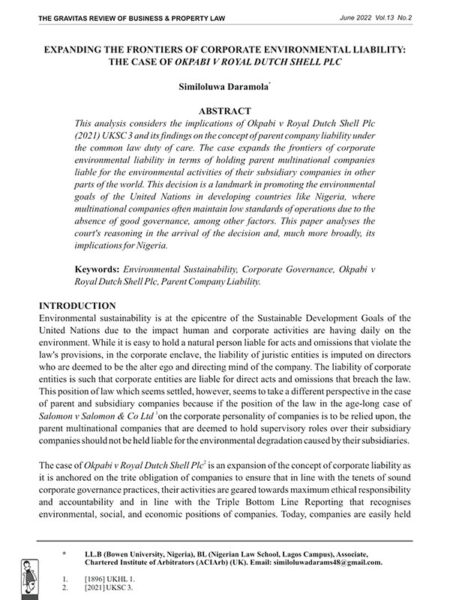
Expanding the Frontiers of Corporate Environmental Liability: The Case of Okpabi v Royal Dutch Shell Plc
0₦2,500.00Similoluwa Daramola, in her paper, Expanding the Frontiers of Corporate Environmental Liability: The Case of Okpabi v Royal Dutch Shell Plc, which reviews the English case, considers the implications of the case and the court’s decision on the concept of the parent company liability under the common law duty of care. The case expands the frontiers of corporate environmental liability in terms of holding parent multinational companies liable for the environmental activities of their subsidiary companies in other parts of the world. Similoluwa argues that the decision is vital in promoting the environmental goals of the United Nations in developing countries like Nigeria, where multinational companies often maintain lower standards of operations.
-
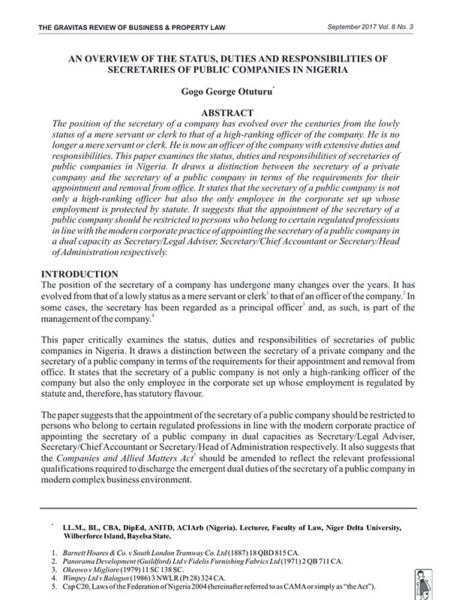
An Overview of the Status, Duties and Responsibilities of Secretaries in Public Companies in Nigeria
0₦2,500.00Gogo Otuturu, Lecturer, Faculty of Law, Niger Delta University, Wilberforce Island, Bayelsa State, provides “An Overview of the Status, Duties and Responsibilities of Secretaries of Public Companies in Nigeria”. He draws a distinction between the secretary of a private company and the secretary of a public company in terms of the requirements for their appointment and removal from office. He notes that the secretary of a public company is not only a high-ranking officer but also the only employee in the corporate set up whose employment is protected by statute. He posits that the modern corporate practice of appointing the secretary of a public company in a dual capacity as Secretary/Legal Adviser, Secretary/Chief Accountant or Secretary/Head of Administration should lead to a rethink of the qualifications of the secretary of a public company.
-
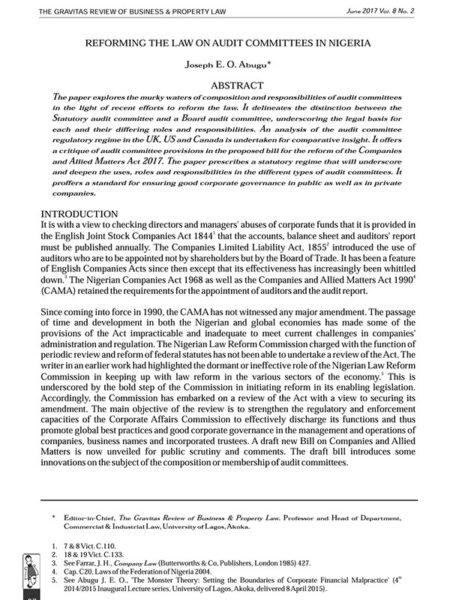
Reforming the Law on Audit Committees in Nigeria
0₦2,500.00Professor Joseph Abugu,Editor-in-Chief, The Gravitas Review of Business & Property Law and Head of Department, Commercial & Industrial Law, University of Lagos in his article “Reforming the Law on Audit Committees in Nigeria” against the background of the proposed bill for the reform of the Companies and Allied Matters Act 2017, explores the murky waters of composition and responsibilities of audit committees and delineates the distinction between the Statutory audit committee and a Board audit committee, underscoring the legal basis for each and their differing roles and responsibilities. He concludes with an analysis of the audit committee regulatory regime in the UK, US and Canada for comparative insight.
-
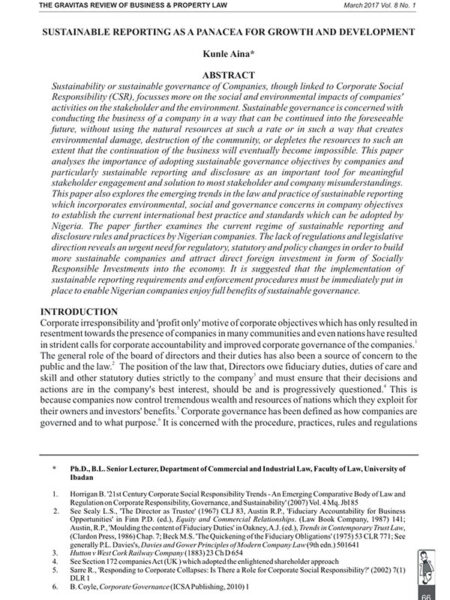
Sustainable Reporting as a Panacea for Growth and Development
0₦2,500.00Dr Kunle Aina of the Department of Commercial and Industrial Law, University of Ibadan in his article “Sustainable Reporting as a Panacea for Growth and Development” examines the concept of Sustainable Reporting, which is reporting the social and environmental impact of corporate activities on stakeholders and the environment. He analyses the importance of adopting sustainable governance objectives by companies and particularly sustainable reporting and disclosure as an important tool for meaningful stakeholder engagement and solution to most stakeholder and company misunderstandings. He reviews international best practices on Sustainable Reporting and bemoans the legislative and regulatory framework for sustainable governance and reports in Nigeria which are so scanty as to be classified as non-existent.
-
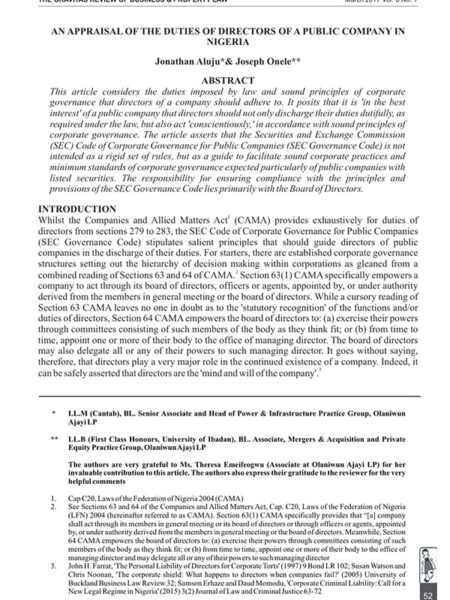
An Appraisal of the Duties of Directors of a Public Company in Nigeria
0₦2,500.00Jonathan Aluju and Joseph Onele, Associates at Olaniwun Ajayi LP in their article “An Appraisal of the Duties of Directors of a Public Company in Nigeria” consider the duties imposed by law and principles of corporate governance that directors of a company should adhere to. They examine the duty of directors, what is ‘in the best interest’ of a public company, corporate benefit and opportunities, and multiple and interlocking directorships within the context of case law, CAMA and SEC Code of Corporate Governance for Public Companies.
-
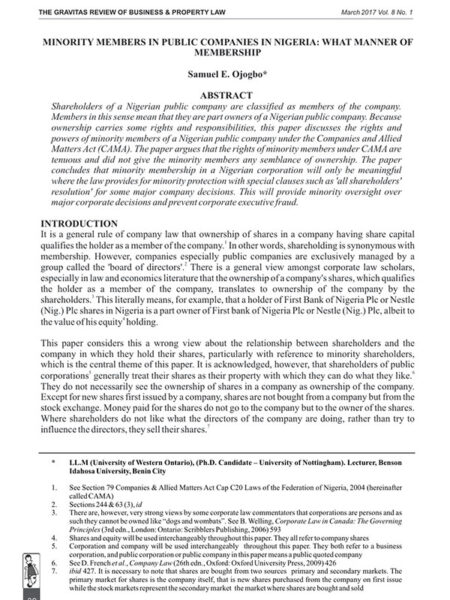
Minority Members in Public Companies in Nigeria: What Manner of Membership
0₦2,500.00Samuel Ojogbo of the Faculty of Law, Benson Idahosa University, Benin City in “Minority Members in Public Companies in Nigeria: What Manner of Membership” discusses the rights and powers of minority members of a Nigerian public company and argues that the rights of minority members are tenuous. He contends that the powers in a Nigerian listed company are in reality shared between the majority members and the board of directors. He posits that only the majority members with their insider knowledge and control of the corporation’s wealth and activities may properly be called the owners while the minority members, the so-called ‘corporate outsiders’, just make up the numbers. He concludes that the rights granted under section 300 of CAMA amount to little, as insider knowledge which a minority member lacks, is required to trigger the rights.
-
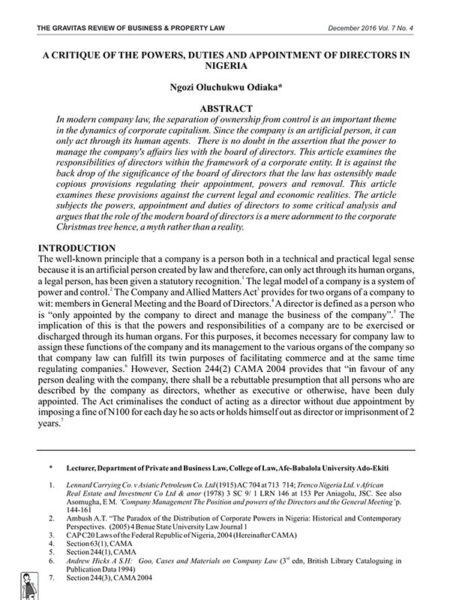
A Critique of the Powers, Duties and Appointment of Directors in Nigeria
0₦2,500.00Odiaka Ngozi of the Department of Private and Business Law, Afe-Babalola University, Ado-Ekiti in his article “A Critique of the Powers, Duties and Appointment of Directors in Nigeria” analyses the appointment, powers and duties of directors and distribution of corporate powers in a company. He explores the historical basis of the modern board structure and argues that the legal position that the board manages the company does not reflect practical realities as real corporate powers are wielded by ‘higher executive directors’ while the board of directors plays mere supervisory roles. He recommends a reform of the law to make the board more proactive.
-
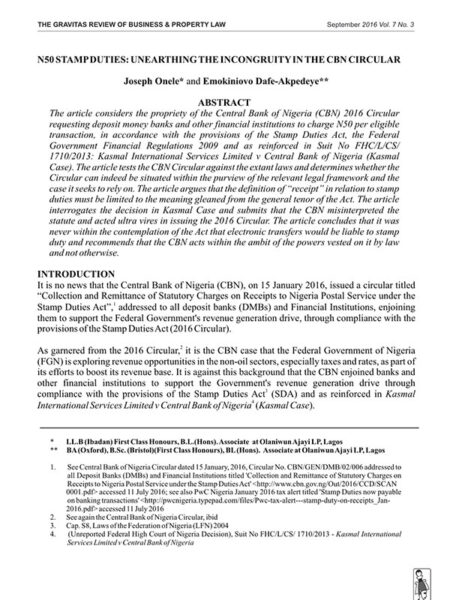
N50 Stamp Duties: Unearthing the Incongruity in the CBN Circular
0₦2,500.00Joseph Onele and Emokiniovo Dafe-Akpedeye of Olaniwun Ajayi LP, in their article “N50 Stamp Duties: Unearthing the Incongruity in the CBN Circular” examine the propriety of the Central Bank of Nigeria 2016 Circular by which Banks and other financial institutions are to charge N50 per eligible transaction. They consider the provisions of the Stamp Duties Act, the Federal Government Financial Regulations 2009 and other extant regulations, and conclude that it was never within the contemplation of the law that electronic transfers would be liable to stamp duty given that, among others, it is impracticable to issue a “receipt duly stamped”.
-
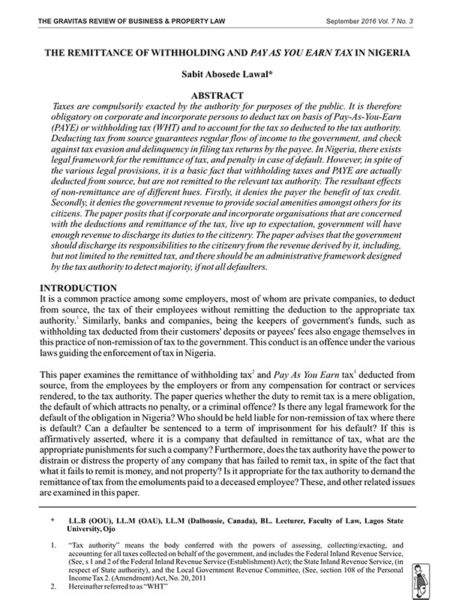
The Remittance of Withholding and Pay as You Earn Tax in Nigeria
0₦2,500.00Sabit Lawal, Lecturer, Faculty of Law, Lagos State University, Ojo, in her article “The Remittance of Withholding and Pay As You Earn Tax in Nigeria” undertakes a comprehensive review of the legal framework for remittance of WHT and PAYE tax in Nigeria. She examines issues of default and penalties for non-remittance with recommendations on how the tide of default may be stemmed.
-
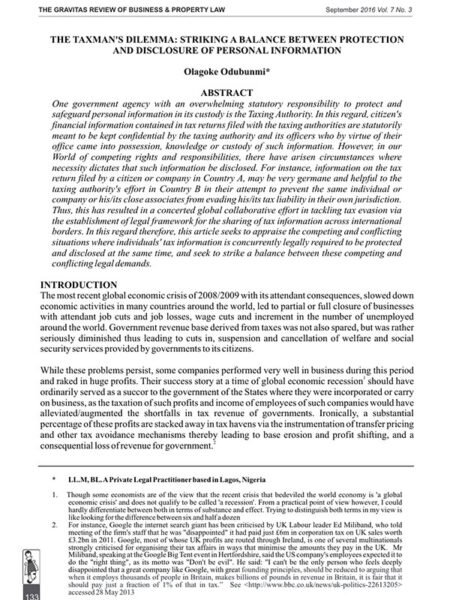
The Taxman’s Dilemma: Striking a Balance between Protection and Disclosure of Personal Information
0₦2,500.00Olagoke Odubunmi, Legal Practitioner, Lagos in “The Taxman’s Dilemma: Striking A Balance Between Protection and Disclosure of Personal Information” examines several provisions of the Companies Income Tax Act and Personal Income Tax Act on protection of personal information of a tax payer against other provisions of national legislations and international obligations mandating disclosure in an era of concerted global efforts against tax evasion, base erosion and profit shifting.
-
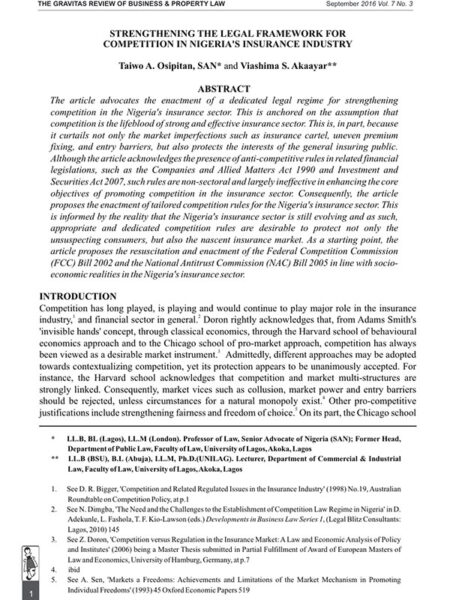
Strengthening the Legal Framework for Competition in Nigeria’s Insurance Industry
0₦2,500.00Professor Taiwo Osipitan, SAN and Dr. Viashima Akaayar of the Faculty of Law, University of Lagos in their article, “Strengthening the Legal Framework for Competition in Nigeria’s Insurance Industry” examine the concept and theories of Competition. Though they acknowledge the presence of antitrust rules in financial legislations such as the Companies and Allied Matters Act 1990 and the Investment and Securities Act 2007, they posit that such rules are non-sectoral and largely ineffective in enhancing the core objectives of promoting competition in the insurance sector. To protect unsuspecting customers, they propose the resuscitation and enactment of the Federal Competition Commission (FCC) Bill and the National Antitrust Commission (NAC) Bill.
The Gravitas Review of Business & Property Law



